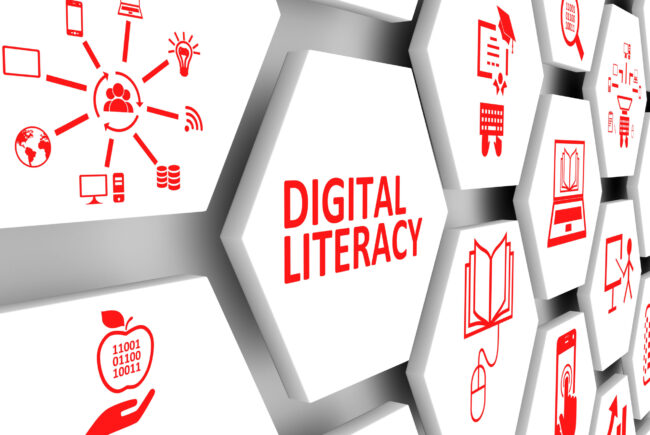

Photo: Shutterstock
Photo: Shutterstock
Data literacy should become a new objective in the curriculum of life, demands data expert Katharina Schüller from the German Association of Founders.
First it was about simple e-mail writing or research on the internet, then it was said that we should learn and be able to deal with the digital world just like reading and writing. Now there is a new buzzword: “data literacy”. What is behind it?

Photo: E + A Fotografie / Tanja Smith
Data literacy encompasses the skills to collect, manage, evaluate and apply data in a critical way. This is not about specialist expertise. Because each of us – consciously or unconsciously – makes decisions based on data every day or is affected by these decisions. Data and information must be procured and classified, and statistics must be critically scrutinised and contextualised, so that these decision-making processes run efficiently and effectively. At the Stifterverband (Association of Founders, Germany), we have been dealing with this in detail and published it in a Data Literacy Charter.
Data literacy includes knowledge and skills related to data protection, for example knowing how to recognise personal data and what the difference is between anonymised and pseudonymised data. Beyond that, however, it is also about value attitudes: why should data be protected? Why should I not click on every consent form on websites without hesitation? How can I weigh up the opportunities and risks of new ways of using data?
By now it seems necessary that we not only know the rules of the road, but also the rules by which the digital world operates?
An internet or data driving licence? That would not be bad. But please not at the age of 18, but much earlier, ideally in primary school.
Should “data literacy” be introduced as a subject at school and in lifelong learning today?
Yes, from my point of view, you should start teaching children data literacy as early as possible. Because it’s not just about technical issues. The moment I read about a statistic or see a visualisation, it’s not just about data, but about its relationship to reality. Data are not simply ‘there’, they are images of real phenomena and in this function, they are often flawed or incomplete. Survey results, for example, can be extremely misleading if the respondents are not selected at random or the questions are asked in a manipulative way. Graphs can also lie; a classic is the truncated Y-axis, which makes small changes suddenly appear very large.
It already starts in everyday life: is someone trained in the principles of data literacy now supposed to check all cookies and evaluate which ones they agree to? That sounds very much like being overwhelmed, especially for those who are neither particularly digitally skilled nor interested.
That would certainly be an excessive demand. But I don’t do a chemical and microbiological analysis of every biscuit before I take a bite in ‘real life’. To survive in everyday life, I need heuristics, i.e. a few simple rules of thumb for deciding whom I trust and whom I don’t trust in standard situations. It’s more about recognising warning signals when these heuristics are not suitable and critical thinking is called for. Just like with technical devices that you bought cheaply online, but which lack the test mark. Figuratively speaking, it’s about a sense for problems: When does the cookie taste musty?
Data literacy is a competence that is necessary in the working world, in administrations, in research and education. Pure user competence is unlikely to be enough. What does data literacy mean in this context?
Managers and professionals need to find a balance between the extent to which they trust data and algorithms. A classic is algorithm-based systems for applicant selection: do they do justice to people? Are they possibly driven by prejudices learned from biased training data? A well-known digitalisation expert from the USA described a case on Twitter in which he and his wife applied for a credit card at the same time, with identical documents. His credit limit was set 20 times higher than that of his wife. No one at customer service was able to give him an explanation. Worse still, no one could change it.
People in decision-making positions are asked to think about the long-term consequences. If algorithms are only right 90% of the time – which would be astonishingly good – it means that hundreds of thousands of pairs of trousers or mobile phones travel thousands of kilometres pointlessly. Every day. Small mistakes can quickly cause great damage.
Katharina Schüller
- graduate statistician
- heads the working group “Statistical Literacy” of the German Statistical Society and is a university lecturer and author of numerous publications
- initiated the ‘Data Literacy Charter’ of the German Stifterverband (Association of Founders) in 2021
- is Chair of the supervisory board of the Institute for Scientific Continuing Education (University of Hagen) and heads the consultancy STAT-UP
- advises the Federal Ministry of Education and Research on the ‘Digital Education Initiative’ and the ‘Roadmap Data Culture and Data Literacy’ as part of the data strategy
- is a permanent member of the Federal Government’s Digital Summit
Author






